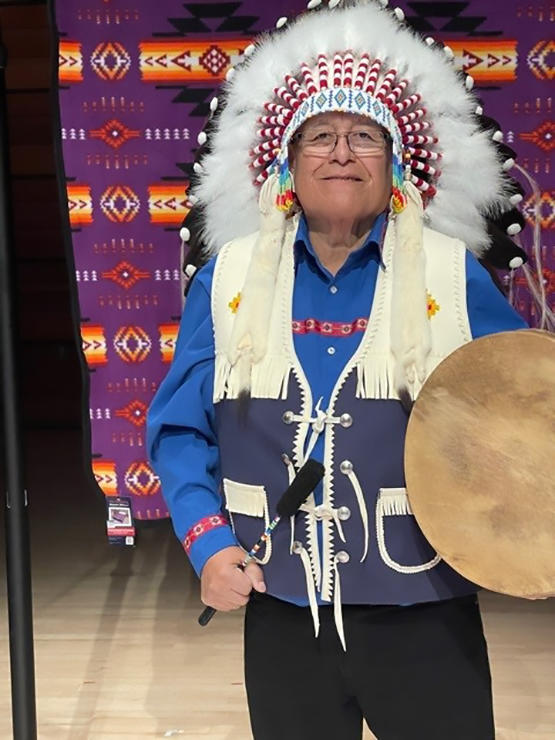
June 9, 2021
Honour Song sends off this year’s graduates with hope and optimism
As family and friends, faculty and staff prepare to celebrate this spring’s graduation ceremonies, graduates face relief and uncertainty as they prepare to launch their careers at a time defined by economic constrictions and the COVID-19 pandemic.
University of Calgary graduates will be sent off on their life journey by the sound of drum — an Honour Song gifted in ceremony to UCalgary by Stoney Nakoda Traditional Knowledge Keeper, Rod Hunter. The UCalgary Honour Song, included in convocation proceedings since 2018, is a tribute to UCalgary graduates, their families and their communities.
This past year, the academic journey of our students and faculty members has been marked by unprecedented challenges, requiring the need to shift and adjust our way of doing and to take the time to reflect upon the world around us. This past year also paved the way for change and shed light on the adaptability and determination of the human spirit to rise to the challenge.
Graduates endured a learning experience like no other: conducting research remotely and studying online, often in isolation while receiving constant updates on a global pandemic, the economic crisis and disappointing employment projections. All this while also watching major societal issues unfold across the globe and here at home, calling on all of us to take a stand against racism and social injustice.
Nevertheless, our graduating students demonstrated success and resiliency, navigating and living though societal and institutional change. Adjusting has been an emotional journey for many and a visible display of strength. This year’s Honour Song will be offered in recognition of the weight of the journey graduating students endured.
It is a great honour for UCalgary to have been gifted this Honour Song, intended to connect us and create space and time and acknowledge the graduates’ individual and collective journeys and academic accomplishments. The song is about hope and fortitude, resilience, and perseverance. It is a song sung at graduation to welcome the next generation of students to their next chapter. The special UCalgary Honour Song's creator hopes it “helps graduates find the spirit of celebration during uncertain times.
“All songs come from the creator,” says Hunter. “Therefore, this song was destined for the U of C and a way to bless all of the students and faculty.
“This song recognizes one’s journey. It is representative of the many milestones people will have in their lives. This year, graduating at this time, enduring a pandemic and lack of community, this song recognizes the milestones the students have recently overcome by completing their education during this time.”

Rod Hunter gets his photo taken after recording the Honor song remotely for 2021 spring convocation years graduates
Photo taken from Facebook
The Honour Song by Rod Hunter
The Honour Song was gifted to the University of Calgary on June 21, 2018, by Elder Hunter and recorded with his drum group, Eya-Hey Nakoda. Initially created in the 1970s, then shared in 1984, Hunter says this song took time because he kept having different experiences in his life that took him away and brought him back to it again.
The Honour Song is performed or played at all major institutional events and convocation. There is a mesmerizing sense of rhythm in that the voices harmonize with the beat of the drums.
Rod Hunter and Dr. Michael Hart
Hunter knows the challenges of pursuing post-secondary education. “I tell my children that the No. 1 thing to be successful is to stay focused,” he says. His own experiences with resilience drive his aspiration for creating music through dark times. Honour, he says, is about respecting someone’s stature.
The song was gifted to the university in ceremony, during the transfer of the ii’ taa’poh’to’p teepee design, marking one of four cultural gifts offered to UCalgary as part of journey of its Indigenous Strategy, ii’ taa’poh’to’p.
The gift also aligned with the appointment of UCalgary’s first vice-provost of Indigenous engagement, Dr. Michael Hart, PhD. “It is an honour to receive the gift of song,” says Hart. “Just as education requires hard work, time and deep thought, it is ultimately an honour when the work has reached a milestone of achievement, when we can visualize our goals and dreams.”
Traditional methods
Traditionally, songs are passed down orally through time memories in an oral context, through oral contracts, and in exchanges that are deep, long, thoughtful and require self-reflection. Hunter says not one person conjures the music; it is a collaborative effort over space and time. It is a journey with others.
The Honour Song is a modernization of traditional powwow music. It has a strong and distinct beat, just like a heartbeat. The lyrics sound like chanting and vary in pitch. It isn’t a typical powwow song sound, though, it is more contemporary and shorter — and a song that one naturally wants to hear again and again.
Since 2018, UCalgary has honoured graduates with the Honour Song during convocation proceedings. Due to the pandemic, Hunter will sing the Honour Song remotely, although the significance is all the same.
“Be proud of what you have accomplished. Be true. Be bold,” Hunter says.
“No matter what phase of your academic career, know that the time spent has been worth it, and that the sleepless nights have meaning, and that, although you might not be walking the stage with your peers in person, be honoured of what you have done. Be proud to have achieved your dreams in a new epoch of time, a recovery of a new age, in a moment when we look to our current and future graduates to guide us in this new period of our time.”




